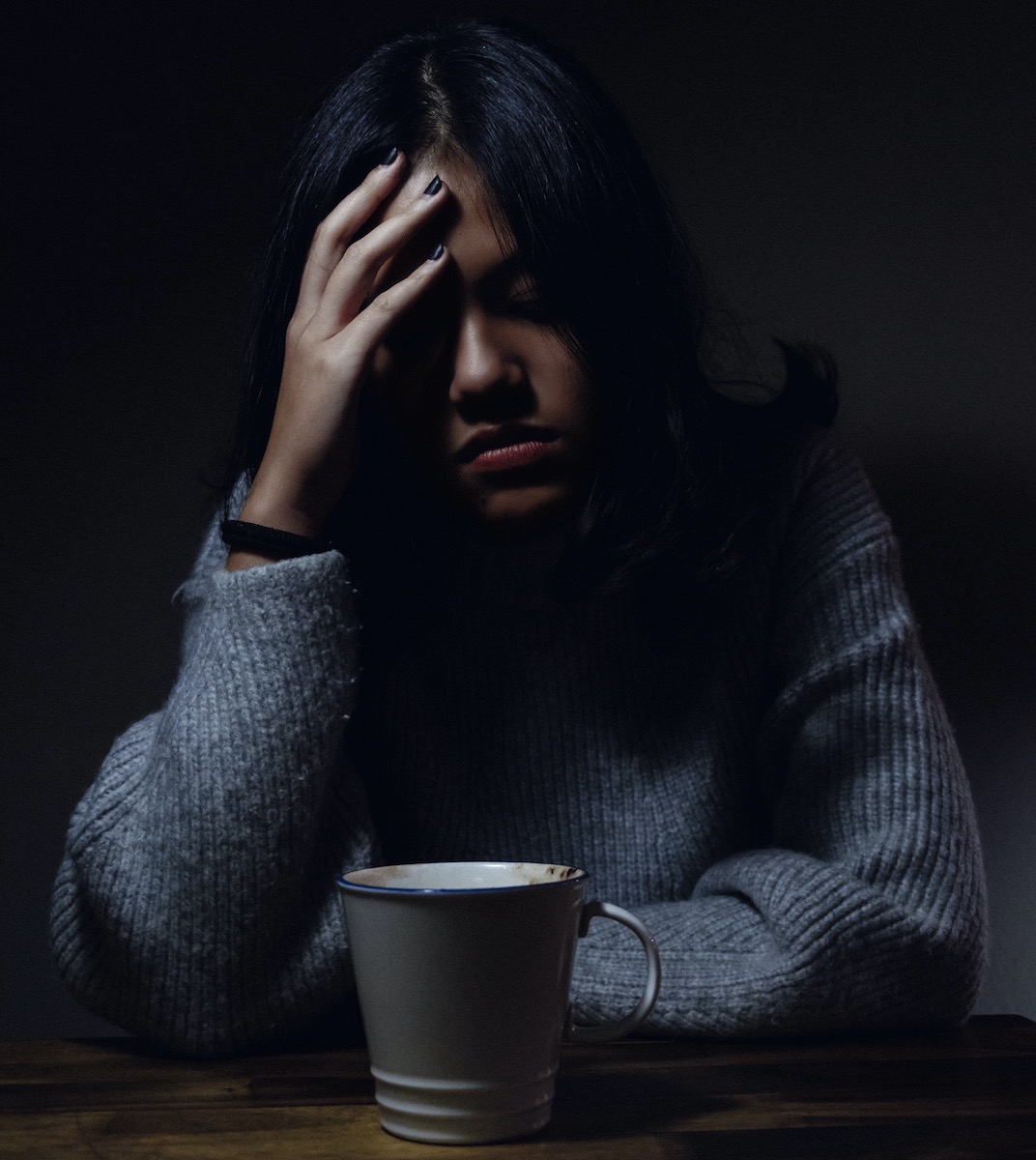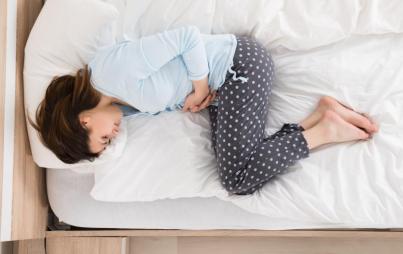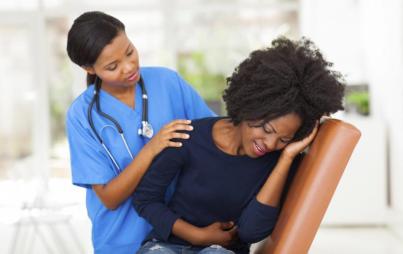
Photo by Anh Nguyen on Unsplash
This article by AnnaMarie Houlis first appeared on Fairygodboss and has been republished with permission.
I'll never forget the time someone told me to "stick a tampon in it" — that I was being "crazy" because my "hormones must be through the roof." To be fair, my hormones were through the roof, and I really could have cried at the drop of a hat — but I didn't need that, because he did the job just fine.
I struggle with premenstrual dysphoric disorder (PMDD), which I liken to what's essentially premenstrual syndrome (PMS) on speed. Throughout a solid chunk of the month leading up to my period, my muscles ache and my breasts swell to the nth degree — so much so that I can't fit them in a bra or sleep on my stomach... or my side... or at all for that matter. It's not a rarity that my cramps cause me to vomit buckets whenever I can get myself out of fetal position in my bed (or, often, on the floor) and to the toilet. And, though I practice daily meditation to be mindful of and allow thoughts to pass without consuming me, I fall into a crippling depressive bout for the seven to 10 days before I start menstruating. That's when I start bleeding so much that it sometimes leaks through my clothes.
It's not fun.
And, yup, I cope with the nauseating pain and the debilitating depressive bouts all while at work for about two-ish weeks (to varying extremities, of course) every single month. I wonder if those around me understand what's going on when I take several bathroom breaks an hour, or when I'm popping Ibuprofens like candy, or when I look like I'm on the verge of tears for, apparently, no reason at all. Of course, some days are better than others, and years of experience have helped me to get a grip so I don't negatively affect those around me — friends, family, partners, colleagues.
But that's just it. We too often expect women to get a grip so they don't impact everyone else and, in doing so, we neglect the seriousness of their experiences. When I see other women around me acting similarly, I know they're likely secretly struggling, too, putting on brave faces because period talk is taboo or because they don't want to give anyone more (unjustifiable) reason to call women incompetent.
While some countries are adopting paid leave for period problems, the silent plight of menstrual disorders affects more women in the workplace than you might think. These disorders can emotionally, mentally and physically paralyze women who are still expected to "power through" at work.
1. Premenstrual Dysphoric Disorder (PMDD)
PMDD affects up to five percent of women of childbearing age, though that number may be much higher since it's a relatively new discovery.
Essentially, PMDD is "a health problem that is similar to premenstrual syndrome (PMS) but is more serious," according to Women's Health. "PMDD causes severe irritability, depression or anxiety in the week or two before your period starts. Symptoms usually go away two to three days after your period starts."
The severe symptoms of PMDD include, but are not limited to, the following:
- A strong feeling of irritability or anger that can affect others
- Feelings of sadness that may even include suicidal thoughts
- Tension and anxiety
- Panic attacks
- Mood swings
- Sudden crying bouts
- A lack of interest in day-to-day activities
- A lack of interest in relationships, romantic or otherwise
- Difficulty focusing and/or thinking
- Exhaustion and low energy levels
- Food cravings and/or binge eating
- Insomnia
- Cramps
- Bloating
- Breast tenderness
- Headaches
- Joint or muscle pain
If you or someone you know is or may be struggling with PMDD, here are some resources to help you learn more and connect with other women with PMDD to find remedies:
- PMDD Support Group - Facebook
- Women's Health - PMDD
- The International Association of Premenstrual Disorders (IAPMD) - PMDD
2. Premenstrual Syndrome (PMS)
PMS refers to the symptoms women may have before and during menstruation. An estimated three of every four menstruating women have experienced some form of PMS, according to MayoClinic.
While PMS symptoms tend to recur in a predictable pattern, the physical and emotional changes a woman endures may vary from slightly noticeable to intense. These symptoms include, but are not limited to, the following:
- Acne flare-ups
- Bloating or weight gain due to fluid retention
- Fatigue
- Anxiety
- Crying spells
- Mood swings
- Irritability
- Changes in appetite changes
- Food cravings
- Insomnia
- Social withdrawal
- Difficulty focusing and/or thinking
- Changes in libido
- Joint or muscle pain
- Headaches
- Breast tenderness
- Constipation or diarrhea
- Alcohol intolerance
If you or someone you know is or may be struggling with PMS, you might want to talk to your gynecologist about the following remedies:
- Hormonal contraceptives
- Diet modifications
- Exercise
- Hot compresses
- Over-the-counter headache medications like Ibuprofen
- Antidepressants
- Nonsteroidal anti-inflammatory drugs (NSAIDs)
- Diuretics
3. Menorrhagia
Menorrhagia, simply put, refers to heavy menstrual bleeding.
"Menorrhagia is the medical term for menstrual periods with abnormally heavy or prolonged bleeding," according to Mayo Clinic. "Although heavy menstrual bleeding is a common concern, most women don't experience blood loss severe enough to be defined as menorrhagia."
That said, menorrhagia still affects a lot of women. In fact, research suggests that 30% of all premenopausal women perceive their menses to be "excessive," and, according to the World Health Organization, 18 million women aged 30 to 55 years old perceive their menstrual bleeding to be "exorbitant." Meanwhile, research shows that 10% of these women do indeed experience severe enough blood loss to be clinically defined as menorrhagia.
The signs and symptoms of menorrhagia may include:
- Leaking through one or more sanitary pads or tampons each hour for several hours
- Needing to double up on sanitary protection to prevent leakages
- Needing to wake up throughout the night to change sanitary protection
- Bleeding for longer than a week
- Passing blood clots that are bigger than the size of a quarter
- Feeling anemic, such as being exhausted or short of breath
- Restricting daily activities due to heavy menstrual flow
If you or someone you know is or may be struggling with menorrhagia, you might want to talk to your gynecologist about new hormonal contraceptives to help control your flow, as well as try different sanitary products like menstrual cups or period panties that tend to hold more blood (and prevent more leakage!) than typical tampons and pads. You don't have to change them as often, either.
4. Amenorrhea
Opposite of menorrhagia is amenorrhea. Amenorrhea is defined as "the absence of menstruation" — such as one or more missed menstrual periods, according to Mayo Clinic. Women who've missed at least three consecutive menstrual periods have amenorrhea, as do girls who haven't yet begun menstruation by the age of 15.
While not bleeding very much — or at all — might sound like a blessing, it actually comes with its own list of cons. That's because causes of amenorrhea include problems with the reproductive organs and glands that help regulate women's hormone levels (or pregnancy!).
As such, symptoms of amenorrhea might include hormonal issues like the following:
- Acne breakouts
- Hair loss
- Headaches
- Milky nipple discharge
- Vision changes
- Excess facial hair
- Pelvic pain
If you or someone you know is or may be struggling with amenorrhea, check out the US Department of Health and Human Services - Amenorrhea to help you learn more about treatment options to discuss with your gynecologist.
5. Endometriosis
Endometriosis is a condition in which a women's endometrium tissue, which is similar to the tissue inside the uterus (the uterine lining), is found outside of the uterus. When this happens — usually on the pelvic peritoneum, on the ovaries, in the recto-vaginal septum, on the bladder and in the bowel — women's bodies may experience a chronic inflammatory reaction that leads to scar tissue, according to according to Endometriosis.org.
Research suggests that endometriosis affects about one in 10 women during their reproductive years (which is usually between the ages of 15 to 49 years old). That is approximately 176 million women in the world, according to Endometriosis.org.
Symptoms of endometriosis include the following:
- Painful periods (i.e. severe cramps)
- Painful ovulation
- Pain during or after sexual intercourse
- Heavy bleeding
- Chronic pelvic pain
- Fatigue
- Infertility
If you or someone you know is or may be struggling with amenorrhea, check out the US Department of Health and Human Services - Endometriosis to help you learn more about treatment options (everything from hormone therapy to surgery) to discuss with your gynecologist.








